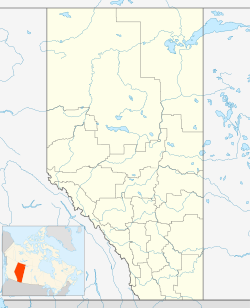Claresholm, Alberta
| Claresholm | |
|---|---|
| Town | |
| Town of Claresholm | |
| Motto: Now you're living ... Now you're home | |
| Location of Claresholm in Alberta | |
| Coordinates: 50°01′10″N 113°34′42″W / 50.01944°N 113.57833°WCoordinates: 50°01′10″N 113°34′42″W / 50.01944°N 113.57833°W | |
| Country |
|
| Province |
|
| Region | Southern Alberta |
| Census division | 3 |
| Municipal district | Municipal District of Willow Creek No. 26 |
| Incorporated | |
| • Village | May 30, 1903 |
| • Town | August 31, 1905 |
| Government | |
| • Mayor | Rob Steel |
| • Governing body | Claresholm Town Council |
| Area (2011) | |
| • Total | 9.08 km2 (3.51 sq mi) |
| Elevation | 1,030 m (3,380 ft) |
| Population (2011) | |
| • Total | 3,758 |
| • Density | 414.0/km2 (1,072/sq mi) |
| Time zone | MST (UTC−7) |
| • Summer (DST) | MDT (UTC−6) |
| Postal code span | T0L 0T0 |
| Area code(s) | +1-403, +1-587 |
| Highways |
Highways 2 Highway 520 |
| Waterways | Willow Creek |
| Website | Official website |
Claresholm is a town located within southern Alberta, Canada. It is located on Highway 2, approximately 91 km (57 mi) northwest of the City of Lethbridge and 125 km (78 mi) south of the City of Calgary.
One of the Famous Five involved in the Persons Case, Louise McKinney, lived in Claresholm and was elected as the Member of the Legislative Assembly of Alberta for the area in the 1917 provincial election.
The location was originally a watering stop for steam engines on the Canadian Pacific Railway line along the Macleod Trail when the trains first arrived in the area in 1891. The first settlers arrived in 1902, and the village was established in 1903. Claresholm was incorporated as a town in 1905, the year Alberta became a province. The community was named after Clare, the wife of a pioneer citizen.
In 1913, Alberta established a demonstration farm and School of Agriculture at Claresholm. The first hospital in Claresholm opened in 1921 and was replaced by the current hospital in 1939.
Royal Canadian Air Force Station Claresholm was established near the town in 1941 to train pilots for service in World War II. It first opened June 9, 1941 as a British Commonwealth Air Training Plan base. No. 15 Service Flying Training School operated at the base from its opening until March 1945. In 1951, the base was used to train pilots for the Korean War and operated as No. 3 Flying Training School. It also trained NATO pilots. The base closed in 1958 and the hangars were converted to industrial use. A portion of the former base also operated as an industrial airport. Among the artifacts in the Claresholm Museum from the air base is a Link Trainer.
...
Wikipedia

